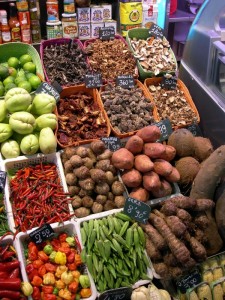
Prime Minister Manmohan Singh, at a press conference in Cannes last week, said inflation in prices of vegetables, milk and eggs was due to prosperity and a changing food basket. Finance Minister Pranab Mukherjee said in Mumbai Monday: “The principal reason (for the price rise) is that the demand for eggs, meat, vegetables and milk has increased.”
Planning Commission member Abhijit Sen, giving reasons behind a change in people’s food habits, said the inflation is driven partly by an increase in per capita income and partly by a change in people’s taste. However, he said it was difficult to say whether inflation in vegetables, milk and eggs was driven by higher demand or lower supply of the consumables.
“We don’t have enough data to justify this trend 100 percent. Data on food output is poor,” Sen said. “High food inflation surprises us all. We need better data on food output,” Sen said.
Food Minister K.V. Thomas, in similar views expressed earlier, said that the production of milk, meat, poultry and vegetables needs to be increased as their changing consumption pattern over the past few years was contributing to food inflation.
“Consumption pattern of milk, meat and poultry and vegetables is changing as compared to previous years,” Thomas said.
The food inflation data shows that the price of foodgrains has remained largely unchanged, while that of vegetables, milk, eggs, meat and fruits has risen substantially. This reflects that while foodgrains remain a staple of the people, they are consuming more of vegetables, milk, eggs and meat.
Sen, Planning Commission member in charge of food and agriculture issues, said there is a change in people’s food habits, but the National Sample Survey Organisation 2009 data indicates there is not much difference in the rate at which people’s food habits have changed over the past decade.
“There is a change in people’s food habits, but it is slow,” he said.
Sen said he is surprised that good monsoon in the past two years has failed to moderate high food prices.
Battling to curb high prices of essential commodities, which have hit the common man hard, the government has been arguing that while “there was no inflation in foodgrains, rising prices of vegetables, milk and eggs were contributing to food inflation”.
Experts are concerned that high food inflation could spill over to other sectors of the economy and affect the growth targets set by the government.
Sen said inflation is expected to come under control by next month.
However, agriculture expert Devinder Sharma blamed the government’s policies for high food inflation. “They need to improve food management,” he said.
The government has also said that increased minimum support price (MSP) for foodgrains has also added to food inflation. Thomas said the government needs to provide better prices to the farmers and hence has to increase the MSP.
The government buys wheat and rice from the farmers at announced MSP and distributes it among eligible beneficiaries through the public distribution system.
In the week ended Oct 22 inflation registered a sharp rise at 12.21 percent — the highest in nine months. Prices of pulses, vegetables and milk and poultry all rose. The week before had seen food inflation logging at 11.43 percent.
According to the latest data on food inflation, vegetables rose 28.89 percent, fruits: 11.63 percent, potatoes: 0.98 percent, eggs, meat, fish: 13.36 percent, cereals: 4.13 percent, rice: 4.21 percent, wheat: (-) 1.54 percent, pulses: 11.65 percent – compared to last year.
IANS



I am still to learn & understand the Indian Economics. But as a professional dealing in infrastructure projects, I see flooding of money. Other examples such as the budget of Commonwealth Games!
May be uncompetitive use of money to an extent is responsible for inflation.
The biggest challenges are short circuit economy i.e. rotation of huge sum of money in few places and among individuals or entities.
Before I end, I would like to put that we are still to see the other side of capitalism that enthrones the highest greed of mankind.